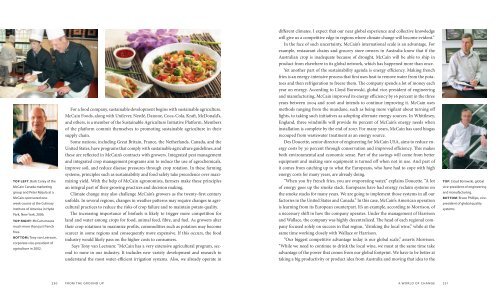From the Ground Up - McCain Foods Limited
From the Ground Up - McCain Foods Limited
From the Ground Up - McCain Foods Limited
Create successful ePaper yourself
Turn your PDF publications into a flip-book with our unique Google optimized e-Paper software.
ToP lEFT: Barb Corey of <strong>the</strong><br />
<strong>McCain</strong> Canada marketing<br />
group and Peter Reijula at a<br />
<strong>McCain</strong>-sponsored oneweek<br />
course at <strong>the</strong> Culinary<br />
Institute of America in Hyde<br />
Park, New York, 2006.<br />
ToP rIGhT: <strong>McCain</strong> means<br />
much more than just french<br />
fries.<br />
boTTom: Tony van Leersum,<br />
corporate vice-president of<br />
agriculture in 2002.<br />
For a food company, sustainable development begins with sustainable agriculture.<br />
<strong>McCain</strong> <strong>Foods</strong>, along with Unilever, Nestlé, Danone, Coca-Cola, Kraft, McDonald’s,<br />
and o<strong>the</strong>rs, is a member of <strong>the</strong> Sustainable Agriculture Initiative Platform. Members<br />
of <strong>the</strong> platform commit <strong>the</strong>mselves to promoting sustainable agriculture in <strong>the</strong>ir<br />
supply chain.<br />
Some nations, including Great Britain, France, <strong>the</strong> Ne<strong>the</strong>rlands, Canada, and <strong>the</strong><br />
United States, have programs that comply with sustainable agriculture guidelines, and<br />
<strong>the</strong>se are reflected in <strong>McCain</strong>’s contracts with growers. Integrated pest management<br />
and integrated crop management programs aim to reduce <strong>the</strong> use of agrochemicals,<br />
improve soil, and reduce disease pressures through crop rotation. In <strong>the</strong>se farming<br />
systems, principles such as sustainability and food safety take precedence over maximizing<br />
yield. With <strong>the</strong> help of <strong>McCain</strong> agronomists, farmers make <strong>the</strong>se principles<br />
an integral part of <strong>the</strong>ir growing practices and decision making.<br />
Climate change may also challenge <strong>McCain</strong>’s growers as <strong>the</strong> twenty-first century<br />
unfolds. In several regions, changes in wea<strong>the</strong>r patterns may require changes in agricultural<br />
practices to reduce <strong>the</strong> risks of crop failure and to maintain potato quality.<br />
The increasing importance of biofuels is likely to trigger more competition for<br />
land and water among crops for food, animal feed, fibre, and fuel. As growers alter<br />
<strong>the</strong>ir crop rotations to maximize profits, commodities such as potatoes may become<br />
scarcer in some regions and consequently more expensive. If this occurs, <strong>the</strong> food<br />
industry would likely pass on <strong>the</strong> higher costs to consumers.<br />
Says Tony van Leersum: “<strong>McCain</strong> has a very extensive agricultural program, second<br />
to none in our industry. It includes new variety development and research to<br />
understand <strong>the</strong> most water-efficient irrigation systems. Also, we already operate in<br />
different climates. I expect that our near global experience and collective knowledge<br />
will give us a competitive edge in regions where climate change will become evident.”<br />
In <strong>the</strong> face of such uncertainty, <strong>McCain</strong>’s international scale is an advantage. For<br />
example, restaurant chains and grocery store owners in Australia know that if <strong>the</strong><br />
Australian crop is inadequate because of drought, <strong>McCain</strong> will be able to ship in<br />
product from elsewhere in its global network, which has happened more than once.<br />
Yet ano<strong>the</strong>r part of <strong>the</strong> sustainability agenda is energy efficiency. Making french<br />
fries is an energy-intensive process that first uses heat to remove water from <strong>the</strong> potatoes<br />
and <strong>the</strong>n refrigeration to freeze <strong>the</strong>m. The company spends a lot of money each<br />
year on energy. According to Lloyd Borowski, global vice-president of engineering<br />
and manufacturing, <strong>McCain</strong> improved its energy efficiency by 16 percent in <strong>the</strong> three<br />
years between 2004 and 2006 and intends to continue improving it. <strong>McCain</strong> uses<br />
methods ranging from <strong>the</strong> mundane, such as being more vigilant about turning off<br />
lights, to taking such initiatives as adopting alternate energy sources. In Whittlesey,<br />
England, three windmills will provide 80 percent of <strong>McCain</strong>’s energy needs when<br />
installation is complete by <strong>the</strong> end of 2007. For many years, <strong>McCain</strong> has used biogas<br />
recouped from wastewater treatment as an energy source.<br />
Des Doucette, senior director of engineering for <strong>McCain</strong> USA, aims to reduce energy<br />
costs by 30 percent through conservation and improved efficiency. This makes<br />
both environmental and economic sense. Part of <strong>the</strong> savings will come from better<br />
equipment and making sure equipment is turned off when not in use. And part of<br />
it comes from catching up to what <strong>the</strong> Europeans, who have had to cope with high<br />
energy costs for many years, are already doing.<br />
“When you fry french fries, you are evaporating water,” explains Doucette. “A lot<br />
of energy goes up <strong>the</strong> smoke stack. Europeans have had energy reclaim systems on<br />
<strong>the</strong> smoke stacks for many years. We are going to implement those systems in all our<br />
factories in <strong>the</strong> United States and Canada.” In this case, <strong>McCain</strong>’s American operation<br />
is learning from its European counterpart. It’s an example, according to Morrison, of<br />
a necessary shift in how <strong>the</strong> company operates. Under <strong>the</strong> management of Harrison<br />
and Wallace, <strong>the</strong> company was highly decentralized. The head of each regional company<br />
focused solely on success in that region, “drinking <strong>the</strong> local wine,” while at <strong>the</strong><br />
same time working closely with Wallace or Harrison.<br />
“Our biggest competitive advantage today is our global scale,” asserts Morrison.<br />
“While we need to continue to drink <strong>the</strong> local wine, we must at <strong>the</strong> same time take<br />
advantage of <strong>the</strong> power that comes from our global footprint. We have to be better at<br />
taking a big productivity or product idea from Australia and moving that idea to <strong>the</strong><br />
230 f rom T he ground uP<br />
a world of change 231<br />
ToP: Lloyd Borowski, global<br />
vice-president of engineering<br />
and manufacturing.<br />
boTTom: Bruce Phillips, vicepresident<br />
of global quality<br />
systems.






